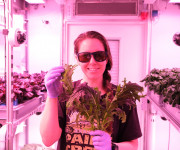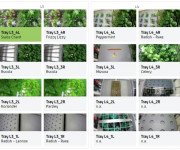Ground Demonstration of
Plant Cultivation Technologies
for Safe Food Production
in Space
A critical component of future, human exploration to worlds unknown, will be the supply of edible food for crewmembers. To develop innovations in cultivating food in closed-loop systems becomes integral to future missions.
The goal of the EDEN ISS project is to advance controlled environment agriculture technologies beyond the state-of-the-art. It focuses on ground demonstration of plant cultivation technologies and their application in space. EDEN ISS develops safe food production for on-board the International Space Station (ISS) and for future human space exploration vehicles and planetary outposts.
EDEN ISS develops an advanced nutrient delivery system, a high performance LED lighting system, a bio-detection and decontamination system and food quality and safety procedures and technologies.
A mobile container-sized greenhouse test facility was built to demonstrate and validate different key technologies and procedures necessary for safe food production within a (semi-) closed system.
Invalid Displayed Gallery
The plant cultivation technologies are tested in a laboratory setting at the sites of the consortium partners. All systems were integrated at DLR in Bremen, followed by an extensive test period. In October 2017, the complete facility was shipped to the German Neumayer III station in Antarctica. The station is operated by the Alfred-Wegener-Institute and has unique capabilities and infrastructure for testing plant cultivation under extreme environmental and logistical conditions. The container-sized greenhouse of the EDEN ISS project provides year-round fresh food supplementation for the Neumayer Station III crew.
Timeline
EDEN ISS is a 4-year project under the European Union‘s Research and Innovation Action program Horizon 2020, within the topic of ‘Space exploration / Life support.’ The EU-H2020 funded project part started March 2015 and concluded February 2019. It was extended through additional funds by the DLR and the Alfred-Wegener-Institute until 2021. In 2021 NASA and the German Aerospace Center (DLR) have begun a joint series of experiments on vegetable cultivation techniques for use on the Moon and Mars. Until early 2022, NASA guest scientist Jess Bunchek will research how future astronauts could grow lettuce, cucumbers, tomatoes, peppers and herbs, using as little time and energy as possible. To this end, she will be working at DLR’s EDEN ISS Antarctic greenhouse, where she will put greenhouse technologies and plant varieties to the test.




